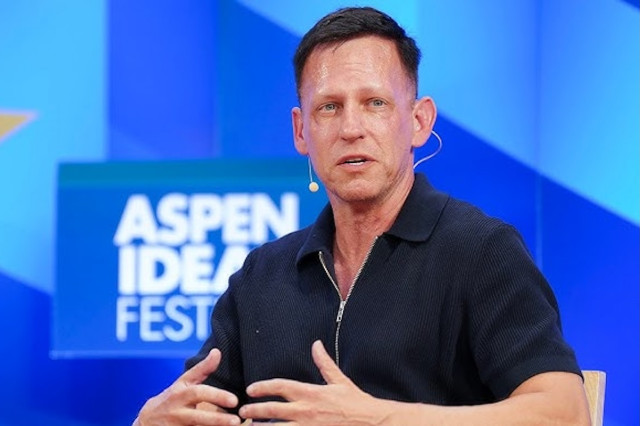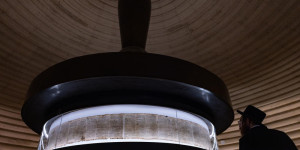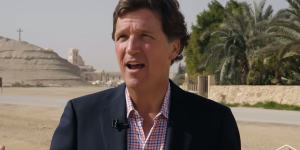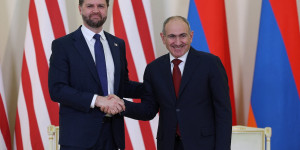Tech billionaire Peter Thiel warns of 'Antichrist' – denies his tech projects are hastening his arrival

Peter Thiel, one of the world’s most influential tech billionaires, recently publicly warned of the coming of the “Antichrist,” but denied that the technologies he is funding are hastening his arrival.
“You have been giving talks recently about the concept of the Antichrist, which is a Christian concept, an apocalyptic concept,” New York Times journalist Ross Douthat said to Thiel during an interview for Douthat’s podcast Interesting Times. “What does that mean to you? What is the Antichrist?”
Noting that he “could talk about it for a long time,” Thiel explained his belief that the Antichrist will publicly warn about the dangers of AI, rather than advocating for their acceleration.
Thiel argued that many of those who warn of the dangers of scientific advancement, such as the risks of nuclear war or environmental destruction, use these warnings to justify the introduction of totalitarian control systems.
“Obviously, there are certain types of risks with AI,” Thiel acknowledged. “But I always think that if we’re going to have this frame of talking about existential risks, perhaps we should also talk about the risk of another type of a bad singularity, which I would describe as the one world totalitarian state. Because I would say the political solution, the default political solution people have for all these existential risks is one world governance.”
Thiel said he believes the Antichrist, whether literal or symbolic, will justify the need for a world government by warning of an AI catastrophe, saying the Antichrist will argue that “we need a one world government to control all the computers, log every single keystroke, to make sure people don’t program a dangerous AI.”
He argued that the Antichrist will present a global government as the alternative to Armageddon: “You have the one world state of the Antichrist, or we’re sleepwalking towards Armageddon.”
He also directly referenced 1 Thessalonians 5:3, saying that “the slogan of the Antichrist is ‘peace and safety.’”
Thiel believes that, with the notable exception of the computing world, science has for decades been characterized by stagnation rather than progress.
The Antichrist, Thiel argued, will advocate for continued technological stagnation by means of global government, ostensibly to save humanity from the dangers of out-of-control technology.
Noting that Thiel is “an investor in AI,” as well as being “deeply invested in Palantir, in military technology, in technologies of surveillance, and technologies of warfare,” Douthat asked Thiel if he believed his work might, in fact, hasten the Antichrist’s coming.
“When you tell me a story about the Antichrist coming to power and using the fear of technological change to impose order on the world, I feel like that Antichrist would maybe be using the tools that you are building,” Douthat told Thiel.
“Wouldn’t the Antichrist be like, ‘Great, we’re not going to have any more technological progress. But I really like what Palantir has done so far,’ right? I mean, isn’t that a concern? Wouldn’t that be the irony of history….that the man publicly worrying about the Antichrist accidentally hastens his or her arrival?”
“Look, there are all these different scenarios,” Thiel responded. “I obviously don’t think that that’s what I’m doing.”
In two interviews conducted last year by the Hoover Institution’s Peter Robinson, Thiel spoke at greater length about his understanding of biblical prophecy.
Thiel stated in the first interview his belief that “in some sense, the apocalyptic prophecies are just a prediction of what humans are likely to do.”
In the second interview, which focused specifically on Thiel’s understanding of the Antichrist, he said that “you can think of it as a type, a system, [or] a person.”
Whether a literal person or not, Thiel argued that “the Antichrist takes over by talking about Armageddon.”
Thiel, who identifies as a Christian but says he is “proud to be gay,” has been an influential supporter of the political careers of both U.S. President Donald Trump and Vice President JD Vance.
He co-founded tech companies, such as PayPal and Palantir, was a key investor in Facebook and OpenAI, and has long advocated for and invested in life-extension technologies.
In the interview with Douthat, Thiel did not explicitly condemn transhumanism, but rather argued it doesn’t go far enough.
After Douthat asked him if he “would prefer the human race to endure,” Thiel hesitated for a few moments.
Even though he eventually answered “yes,” Thiel indicated he believed that humanity should transcend its own nature both physically and spiritually, using technology as a means of enacting such a transformation.
Comparing transhumanism to transgenderism and transvestitism, Thiel said that “the critique [of those ideas] is not that it’s weird and unnatural,” but that “it’s so pathetically little.”
“Okay, we want more than cross-dressing or changing your sex organs,” he said.
“We want you to be able to change your heart, and change your mind, and change your whole body. And then Orthodox Christianity, by the way, the critique Orthodox Christianity has of this is these things don’t go far enough – like that transhumanism is just changing your body, but you also need to transform your soul, and you need to transform your whole self.”
Though not an Orthodox Christian, Thiel was apparently referencing the Orthodox teaching of “theosis,” which states that we were created to become like God through union with Christ, and that both our bodies and souls are meant to be increasingly transformed by the indwelling of the Holy Spirit within us.
Thiel, however, believes this process involves both God’s grace and technological progress (in addition to rejecting fundamental Christian teachings on sexual morality).
Douthat, a Roman Catholic, pushed back on Thiel’s view.
“The promise of Christianity in the end is that you get the perfected body, and the perfected soul through God’s grace,” he said. “And the person who tries to do it on their own with a bunch of machines is likely to end up as a dystopian character.”
Thiel answered that “the way I understand the Judeo-Christian inspiration is it is about transcending nature.”
“The natural thing in a Christian sense is that you’re messed up,” he continued. “And that’s true. But…with God’s help, you are supposed to transcend that and overcome that.”
Yet, the transhumanists building superintelligent AI, Douthat noted, do not seek the immortality of God – they seek to gain immortality apart from Him.
“Present company excepted, most of the people working to build the hypothetical machine-god don’t think they’re cooperating with Yahweh, Jehovah, the Lord of Hosts,” Douthat said.
“They think that they’re building immortality on their own – right?”
Jacob Leonard Rosenberg is an American-Israeli, an Evangelical Christian and the son of the founder of ALL ISRAEL NEWS. He writes about the intersection of science, technology, individual liberty and religious freedom.













